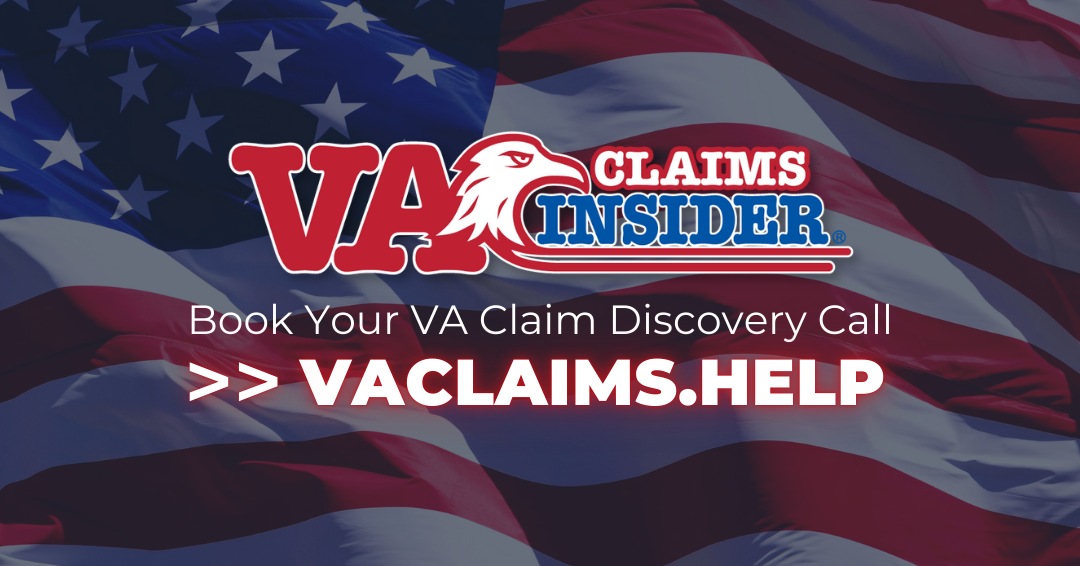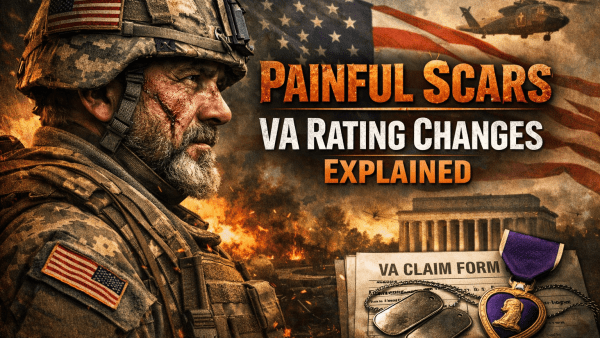Looking for Expert-Level VA Claim Answers?📱Call Us Now! 737-295-2226
If you’re a veteran facing incarceration—or you know someone who is—you might be wondering, “Do I lose my VA disability benefits if I go to jail?”
It’s a tough question, and the answer depends on your situation.
The truth is you don’t automatically lose your VA benefits just because you’re incarcerated, but there are important rules and restrictions you need to know.
In this article from VA benefits expert Brian Reese, we’ll explain what happens to your VA disability payments if you’re jailed or imprisoned, how much you’re still eligible to receive, and what steps you need to take to protect your benefits during and after incarceration.
We’ll also cover how your family members may still receive financial support and how to restore your full benefits once you’re released.
As always, our goal is to help you understand your rights and maximize the benefits you’ve earned through your service to our country—no matter your current circumstances.
Table of Contents
Summary of Key Points
- VA Disability Benefits Are Reduced, But Not Eliminated: Veterans convicted of a felony and incarcerated for more than 60 days will have their disability compensation reduced. Veterans with a 20% or higher rating will see their payments drop to the 10% rate of $175.51 per month in 2025, while those with a 10% rating will have their payments cut in half to $87.75 per month in 2025. Full payments may be restored after release once the VA is properly notified and required documentation is provided.
- VA Education Benefits Are Limited During Incarceration: VA education benefits are limited during incarceration. Veterans convicted of a felony are only eligible for tuition, fees, and supplies but not monthly stipends. Veterans convicted of misdemeanors or placed in halfway houses can still receive full education benefits, including stipends.
- Dependents May Qualify for Apportionment: A portion of a veteran’s reduced benefits may be redirected to dependents (spouse, children, or parents) through apportionment, which is based on financial need. However, incarcerated dependents are not eligible for apportionment.
- VA Benefits Resume After Release: Veterans can fully reinstate their VA benefits after release by notifying the VA promptly—ideally within 30 days before release—and submitting supporting documentation, such as parole or release papers. Veterans who notify the VA within one year of release may qualify for retroactive payments back to their release date.
Can Veterans Receive VA Benefits While Incarcerated?
Yes, veterans can still receive VA benefits while incarcerated; however, the amount and type of benefits they receive may be reduced depending on the circumstances.
Understanding how incarceration impacts VA disability compensation, pensions, and other benefits is critical for justice-involved veterans.
How Does Incarceration Affect VA Disability Compensation?
If a veteran is convicted of a felony and imprisoned for more than 60 days, VA disability compensation payments are reduced as follows:
- Veterans with a 20% disability rating or higher will receive payments equivalent to the 10% disability pay rate, which is $175.51 per month in 2025.
- Veterans with a 10% disability rating will have their payment cut in half (50%), which equals $87.75 per month in 2025.
Important Notes:
- Veterans incarcerated for misdemeanors or participating in work release programs, living in halfway houses, or under community control will not have their benefits reduced.
- Full VA disability payments may be reinstated after release based on the severity of the service-connected condition.
VA Disability Pension Benefits While Incarcerated
VA pension payments are discontinued entirely after 61 days of incarceration, whether the conviction is for a felony or misdemeanor.
Veterans are strongly encouraged to notify the VA of their incarceration to avoid overpayments and prevent issues with benefit adjustments.
VA Education Benefits for Incarcerated Veterans
Education benefits vary based on the type of conviction:
- Veterans convicted of a felony are eligible for reimbursement of tuition, fees, and supplies only—not monthly stipends.
- Veterans convicted of offenses other than felonies can receive full education benefits, including monthly stipends.
- Veterans in halfway houses or work-release programs may still be eligible for full benefits.
What About Apportionment for Dependents During Incarceration?
Apportionment allows VA benefits to be redirected to a veteran’s spouse, children, or dependent parents during incarceration.
This process is based on financial need and factors such as:
- The income and living expenses of dependents.
- The amount available for apportionment.
- Any special needs of dependents.
Key Considerations:
- VA will notify veterans and their dependents about the option to apply for apportionment.
- Dependents must file a claim to receive apportioned benefits.
- Dependents who are also incarcerated for a felony are not eligible for apportionment.
VA Healthcare and Incarcerated Veterans
Veterans retain eligibility for VA healthcare during incarceration, but VA cannot provide treatment while veterans are in federal, state, or local prisons if the facility has its own healthcare system.
Once released, veterans can reapply for VA healthcare benefits by contacting their local VA medical center.
Programs for Justice-Involved Veterans
1. Health Care for Re-Entry Veterans (HCRV)
The HCRV program helps incarcerated veterans successfully reintegrate into the community after release.
It provides information and resources to support reentry planning and aims to prevent homelessness among veterans post-incarceration:
- Housing resources
- Employment assistance
- Health services
2. Veterans Justice Outreach (VJO)
The VJO program helps veterans avoid unnecessary criminalization and incarceration by providing timely access to VA healthcare, including mental health and substance use services, as well as other VA benefits:
- VA health care
- Mental health care
- Substance abuse treatment
- Other VA services
Resuming VA Benefits After Release
Veterans can have their full VA benefits restored upon release from incarceration.
To expedite reinstatement, veterans should:
- Notify the VA 30 days or less before their anticipated release.
- Provide evidence, such as parole board documentation.
- File claims for restoration of benefits immediately upon release.
If the VA is notified within one year of release, benefits will be restored to the release date; otherwise, benefits will resume from the date VA receives notice.
Source List
VA Benefits and Incarceration: Frequently Asked Questions (FAQs)
What Does VA Consider as Incarceration?
For VA purposes, incarceration refers to confinement in a penal institution following a conviction. This includes individuals who are temporarily allowed outside the institution for furloughs or medical treatment. Confinement also applies to medical facilities, mental institutions, and locations like work camps or boot camps, as long as the confinement is pursuant to a criminal sentence.
How Does Incarceration Impact VA Disability Compensation Benefits?
If a veteran is incarcerated for more than 60 days after being convicted of a felony, VA disability compensation is reduced based on the severity of their rating. For ratings of 20% or higher, payments are reduced to the 10% level. Veterans with a 10% rating will have their payments reduced to half the 10% rate. However, the full benefit amount may resume once the incarceration ends.
What Happens to VA Pension Benefits During Incarceration?
VA pension payments are discontinued if a beneficiary is incarcerated for more than 60 days following conviction of either a felony or misdemeanor. Payments stop completely, unlike disability compensation, which is only reduced. Pension benefits can be resumed once the incarceration ends, provided eligibility criteria are met.
Can Dependents Continue Receiving Benefits While a Veteran is Incarcerated?
Yes, dependents may receive apportioned benefits during the veteran’s incarceration. Apportionment involves redirecting part of the veteran’s reduced or discontinued benefits to eligible dependents, such as a spouse or children. Dependents must apply for apportionment, and VA evaluates each case individually.
Are VA Benefits Affected if a Dependent is Incarcerated?
Dependents’ incarceration generally affects pension benefits but not disability compensation or Dependency and Indemnity Compensation (DIC). If a dependent receiving pension benefits is incarcerated, they may be removed from the award, but this does not apply to those receiving compensation or DIC.
Does VA Conduct Data-Matching Programs to Identify Incarcerated Beneficiaries?
Yes, VA has agreements with the Bureau of Prisons (BOP) and the Social Security Administration (SSA) to periodically match data and identify incarcerated beneficiaries. VA may also receive unofficial notices, which require verification through official sources before taking action.
What Is the Effective Date for Reducing VA Benefits Due to Incarceration?
The effective date for reducing or discontinuing benefits is the 61st day of incarceration following conviction. This applies to both felony and misdemeanor convictions, depending on the type of benefit involved.
What Happens If a Veteran Participates in a Work-Release Program or Resides in a Halfway House?
VA does not reduce or discontinue benefits for individuals participating in work-release programs, under community control, or residing in halfway houses, civil commitment centers, or residential re-entry centers. These situations are treated differently from standard incarceration.
Can Veterans with Total Disability Based on Individual Unemployability (TDIU) Keep Their Rating During Incarceration?
Veterans with TDIU ratings may retain the TDIU designation during incarceration, but their compensation payments are reduced as specified in 38 CFR 3.665. However, VA does not assign or reinstate TDIU ratings during periods of incarceration.
What Happens If the Conviction Is Overturned or Changed?
If a conviction is dismissed, overturned, or reduced to a charge that does not require benefit reduction, VA will restore full benefits retroactively to the effective date of the initial reduction, provided evidence from an official source confirms the change.
How Are VA Education Benefits Affected by Incarceration?
VA reviews whether education benefits are being paid to incarcerated veterans. Adjustments may be necessary, especially if the veteran is receiving housing allowances or other stipends that are not permitted during incarceration.
What Steps Should a Veteran Take After Release to Resume Benefits?
Upon release, veterans should notify VA immediately through written notice, email, or telephone. VA may require confirmation from official sources to verify the release date. Benefits are typically resumed at full rates based on eligibility criteria, and dependents may also have their apportioned benefits adjusted accordingly.
Can VA Recoup Overpayments or Adjustments Made in Error?
Yes, VA may recoup overpayments or adjust benefits if errors are identified, such as failing to properly reduce benefits during incarceration. Veterans have the right to appeal such decisions and provide evidence to dispute the adjustments.
What If a Veteran Is Transferred from a Foreign Penal Institution?
VA does not adjust benefits for veterans incarcerated in foreign penal institutions. However, if the veteran is transferred to a U.S. institution, adjustments will follow the 61st day rule based on the conviction.
What Are Fugitive Felon Rules for VA Benefits?
VA benefits are not payable to beneficiaries or dependents classified as fugitive felons. A fugitive felon is someone fleeing prosecution, violating parole, or evading custody after being convicted of a felony. Restoration of benefits requires proof that the fugitive status has been resolved.
How Can Dependents Apply for Apportionment During Incarceration?
Dependents can apply for apportionment by submitting VA Form 21-0788. The VA evaluates eligibility based on financial need and relationship to the incarcerated veteran. Benefits are distributed to dependents even if the veteran’s payments are reduced or discontinued.
What Documentation Does VA Require to Confirm Incarceration or Release?
VA accepts documents from official sources such as correctional facilities, law enforcement agencies, or prosecutors. Acceptable forms include completed VA Form 21-4193, court records, and official letters verifying incarceration details.
What Is the Process for Restoring VA Benefits After Release?
Once VA confirms the release date, benefits are resumed retroactively if notice is received within one year of release. If notice is delayed, benefits resume from the date VA is notified. Veterans may need to submit updated financial or medical information for certain benefits, such as pensions.
Want Expert-Level Support with Your VA Disability Claim? WE GOT YOUR SIX!
How does VA Claims Insider serve veterans?
We make the confusing and frustrating VA claim process EASY through our 8-step proprietary system and one-on-one coaching; we’re the VA Claim EXPERTS you can trust, and YOU are never alone in this fight against the VA!
You’ll also receive VA disability expert Brian Reese’s SEM Method Blueprint—a proven formula that has helped over 25,000 veterans win their VA disability claims faster:
Strategy + Education + Medical Evidence = VA Rating and Compensation You Deserve FASTER!
Start today and unlock an exceptional level of service you deserve for serving our country:
➡️ You’ll hear from a VA Claim Expert over email within 15 minutes of signing up today.
➡️ You’ll hear from your Veteran Coach team within 24 hours of all inquiries during normal business days/hours.
➡️ Our terms are clear and simple: If we don’t win, you don’t pay. You have nothing to lose and everything to gain.
Click the red button below to start the process of winning your VA claim right now!
Fellow Veterans: Are You Ready to WIN, SERVICE-CONNECT, and INCREASE Your VA Rating FASTER?

- VA Claims Insider is the #1 most trusted name in VA disability claims.
- Work directly with a VA claims coach who can help lead you to VA claim victory.
- 25,000+ disabled veterans served in our membership programs since 2016.
- 30% average rating increase for veterans who complete our #1 rated Elite program.
- 4.7/5.0 average rating out of 5,500+ total reviews; over 4,500 5-star reviews.
About the Author

Brian Reese
Brian Reese is a world-renowned VA disability benefits expert and the #1 bestselling author of VA Claim Secrets and You Deserve It. Motivated by his own frustration with the VA claim process, Brian founded VA Claims Insider to help disabled veterans secure their VA disability compensation faster, regardless of their past struggles with the VA. Since 2013, he has positively impacted the lives of over 10 million military, veterans, and their families.
A former active-duty Air Force officer, Brian has extensive experience leading diverse teams in challenging international environments, including a combat tour in Afghanistan in 2011 supporting Operation ENDURING FREEDOM.
Brian is a Distinguished Graduate of Management from the United States Air Force Academy and earned his MBA from Oklahoma State University’s Spears School of Business, where he was a National Honor Scholar, ranking in the top 1% of his class.



